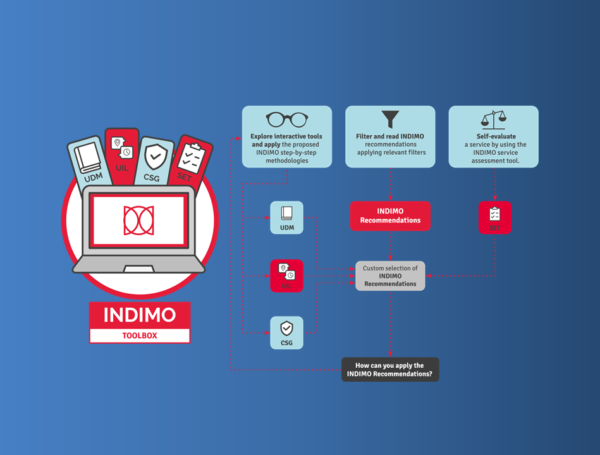By Niklas Schmalholz, POLIS Network,
Debates about public transport often focus on new infrastructure, multimodal hubs, digitisation or the use of public space. Whether its equality, equity, accessibility or inclusion – the human scale of (digital) infrastructure is often of secondary importance. Luckily, INDIMO, TRIPS, and DIGNITY, three EU-funded projects joint forces to showcase their solutions to break down physical and digital barriers that hinder equal access to mobility in the framework of a final conference, which took place on 7 December 2022 in Brussels, Belgium. The hybrid format of the event allowed the experts from the INDIMO, TRIPS and DIGNITY projects to engaged with more than 70 stakeholders in an interactive manner in the form of three dedicated roundtable discussions.
The joint event was officially started with introductory statements of Andras Mogyoro from DG Move and the responsible CINEA project officer Anca Pasca, who praised the unique inclusive aspects of the three projects. Next, the three projects’ coordinators summarized their main achievements before they handed over the discussion to the audience.
A dozen round tables enabled the stakeholders to discuss the opportunities to empower user organisations to raise their voice on inclusivity in transport services. After a short exchange among the participants in the small groups, the results were presented to the wider audience in form of short statements. This engaging format helped to promote exchange between stakeholders and provided a great detailed summary of opinions related to inclusiveness and accessibility of transport services and their commercial potential.
In addition to these lively exchanges, project partners showcased that mobility providers still have some hurdles to overcome in order to offer inclusive and barrier-free mobility services. One of them was Laura Alčiauskaitė from the European Network on Independent Living (ENIL), who spoke as a transport user, who experiences the lack of accessibility during her daily commutes in a wheelchair. As part of the TRIPS project, she had a particularly critical view on the authorities, which was backed up by statistics, as the majority of polled people with disabilities were very or fairly dissatisfied with the integrative work of the state and the transport authorities. Luckily, TRIPS and ENIL provided clear-cut solutions by suggesting a stronger cooperation between disability experts, NGOs and transport providers through digital education or direct exchange. She highlighted that people with disabilities do not want specialised transport as a dedicated solution but would like to use the same mobility offers as everyone else. Laura Alčiauskaitė summarised her presentation by emphasising that ‘accessibility is a door-to-door issue’.
The event was summarised by several joint recommendations towards city official and mobility stakeholders from the three EU-funded projects. All three entities agreed that the focus should be on the exchange between policy makers and users. The latter group should be presented in its entirety by involving a wide range of stakeholders, users, and non-users in particular, in the co-design of inclusive and accessible transport products and services. Furthermore, policy makers should embrace inclusive co-design principles in the next EU transport strategy, in the guidelines for local sustainable urban mobility plans (SUMP) and define key performance indicators to monitor progress.
The full list of recommendations is available here
Did you miss the conference?
We have recorded the entire event for you to watch it again! Check all presentations and highlights here:




